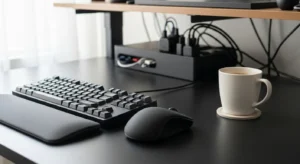
Setting the Stage: Micro-Habits That Make Planning Stick
The 1-3-5 rule provides a brilliant structure for your day, but a structure is only as strong as its foundation. To get the most out of this simple daily planning rule, you need to create an environment—both physical and digital—that supports focus and minimizes friction. This is where micro-habits come in. These are tiny, almost effortless routines that, when practiced consistently, build a powerful platform for productivity.
These aren’t massive life changes. They are small adjustments that make it easier to follow your plan and harder to get derailed by distraction. Think of them as the support crew for your 1-3-5 list.
The One-Screen Phone: Your Digital Declutter
Our smartphones are an incredible source of distraction. The mere sight of a social media or news app icon can trigger a subconscious urge to open it, pulling you away from your intended task. The “one-screen phone” is a simple but profound productivity hack to counteract this.
Here’s how you do it: Take every single app on your phone’s home screen—except for the absolute essentials like Phone, Messages, and maybe your Calendar—and drag them into a single folder. Now, move that folder to the second page of your phone. Your home screen should be nearly blank. The goal is to break the mindless muscle memory of tapping on an app just because it’s there. To get to your distracting apps, you now have to consciously swipe to the next screen, open the folder, and find the app. This tiny bit of friction is often enough to make you pause and ask, “Do I really need to open this right now?” It transforms your phone from a temptation machine back into a tool.
The 10-Minute Desk Reset: A Physical Clean Slate
A cluttered desk can lead to a cluttered mind. The visual noise of stacked papers, empty coffee mugs, and tangled wires creates a low-grade level of stress and makes it harder to focus on the task at hand. The 10-minute desk reset is your end-of-day ritual to combat this.
Before you shut down your computer for the day, set a timer for ten minutes. In that time, do a rapid tidy-up. Put away papers, throw out trash, wipe down the surface, and arrange your keyboard and mouse for the next morning. It’s a small investment of time that provides an outsized psychological return. When you arrive at your desk the next morning, you are greeted with a clean, orderly space. This sense of calm and control makes it infinitely easier to sit down and begin working on your “1” big task without feeling overwhelmed before you even start.
The 15-Minute Weekly Review: Your Strategic Check-In
Effective daily planning doesn’t happen in a vacuum. It’s informed by a larger strategy. The 15-minute weekly review is your command center for the week ahead. Block out a recurring 15-minute appointment with yourself every Friday afternoon or Sunday evening.
During this time, you’ll do three things. First, look back at the past week’s calendar and to-do lists to see what you accomplished and what got pushed aside. Second, look forward at the upcoming week’s appointments and deadlines. Third, based on this information, identify the major priorities for the coming week. This is where you’ll spot the likely candidates for your “1” big task for each day. This short, strategic check-in ensures that your daily 1-3-5 lists are aligned with your larger goals, preventing you from being busy but not productive.
The “Time Audit” Snippet: Discovering Where Your Time Really Goes
Many of us have a vague idea of how we spend our time, but we are often wrong. A time audit is the practice of systematically tracking your activities to get an accurate picture of your day. A full-blown audit can feel intimidating, so start with a simple “snippet.”
For just two days this week, grab a notebook or open a simple text file. Every 30 or 60 minutes, write down what you just did. Be honest and non-judgmental. If you spent 30 minutes scrolling social media, write it down. The goal isn’t to shame yourself; it’s to gather data. You might discover that “quick checks” of your email are actually taking up 90 minutes of your day, or that you’re most focused between 10 AM and noon. This awareness is gold. It helps you make more realistic 1-3-5 plans and identify time-wasting habits that are sabotaging your best intentions.





